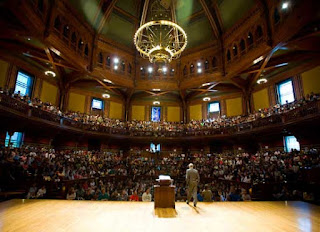It is hard to think of an American city that is doing really well these days. Dense urban poverty in the core, super-high rates of unemployment, failing schools for many urban children, high rates of crime, chronic and overwhelming fiscal crises resulting from too little public revenue for needed public services, and health outcome discrepancies that mark debilitating life disadvantages for urban people -- these seem to be fairly widespread features of cities from Miami to Cleveland to Los Angeles to Chicago to Detroit.
The most recent victim of the urban crisis in the area of publicly provided social services in my city, Detroit, is indicative; this week it was announced that Detroit's Neighborhood Services Organization would lose 2/3 of its funding effective immediately (link). This program reaches out to Detroit's homeless people and provides transition assistance permitting 1000 people per year to return to housed status. It is now forced to close down its operations entirely until October 1, since the program has already expended 1/3 of its budget for 2009-10. No one disputes that NSO is doing great work and returning multiples of benefits relative to its budget; but the state's fiscal crisis has been passed on to this effective, people-oriented program. (CEO Sheilah Clay was featured as a guest on the Craig Fahle show on WDET today -- one of the best parts of the urban Detroit dial. Thanks, Craig!)
So cities are suffering from very significant structural disadvantages in the United States today. And yet, as Richard Florida argues so persistently and so correctly, cities are crucial to the future of the United States and the rest of the world (link). When they are healthy, they create a concentration of talent, innovation, and synergy that simply cannot be beaten. So we need healthy cities and metropolitan regions if we are to thrive in the twenty-first century.
So what can be done, given that the deck seems to be stacked against our cities? This evening Judith Rodin, president of the Rockefeller Foundation and former president of the University of Pennsylvania, gave an important lecture on this subject at Wayne State University in its Van Dusen Forum on Urban Issues. Rodin is an ideal speaker on this subject, because the University of Pennsylvania developed very strong urban renewal strategies aimed at West Philadelphia during her tenure, and because the Rockefeller Foundation has taken urban revitalization as one of its core goals for quite a few decades. Rodin is the author of an important book about the process that unfolded in Philadelphia around the University of Pennsylvania (The University and Urban Revival: Out of the Ivory Tower and Into the Streets), and it is worth reading. She estimates that there are roughly 50 "megaregions" in the United States -- Detroit Metro, Chicago-Land, ... -- and that these megaregions represent 65% of the population and a higher percentage of all economic activity. So healthy development of American cities is enormously important. But likewise, the institutions that find themselves deeply integrated into the geography of these cities urgently need a future in which their cities begin to grow more habitable, healthy, and equitable. Here is a memorable line from the speech -- "Blight of the city becomes the plight of the university."
What actors and strategies can help attain a positive trajectory of urban revitalization? Rodin's central thrust is that universities and health systems can serve as "anchor" institutions in cities, and that they can design strategies that substantially improve the economic development and quality of life of the cities they inhabit. (She calls these institutions "eds and meds".) They provide very significant employment opportunities and purchasing power in the city; and more important, they necessarily make significant investments in real estate and infrastructure in the city. So in principle, it is credible that the resources of these institutions could be used in ways that leverage positive change in the cities in which they live.
But Rodin draws several very important lessons from the example of Penn and Philadelphia. There needs to be a broad and sustained institutional commitment to making strategic decisions around the goal of enhancing the process of urban development. The strategies can't be "one-off" -- they need to be sustained and thoughtful. Strategies need to be coherent and comprehensive -- not piecemeal and stop-and-go. Third, she emphasizes that successful revitalization strategies require us to think innovatively. Existing solutions haven't worked; we need to bring fresh thinking to the situations we confront and the outcomes we want to achieve. And, finally, she emphasizes over and over the need for partnership and community participation in the plans that the institution arrives at. Full, uninhibited partnership is essential if any of these strategies are to work. So communication, partnership, and genuine collaboration with all stakeholders is essential to a successful strategy. Another memorable line -- "Urban revitalization can't be done for the community or to the community; it must be done with the community."
The examples that Rodin offered from Philadelphia largely had to do with neighborhood revitalization and investments by the university in stabilizing the neighborhoods surrounding it in West Philadelphia. For example, the university bought dozens of homes and buildings in the neighborhoods, renovated them, and leased them back to residents and businesses; and, significantly, it did so at a loss. The idea was to make attractive properties available to city residents and businesses, bringing housing, children, and consumers into once-blighted neighborhoods. Another example -- she highlighted crime and safety on the streets as a key issue; so the university organized a program for street lighting in a number of neighborhoods. The new lighting system invited people back into the streets; but more people in the streets in turn reduced the prevalence of crime. A third example -- she talked about a mortgage incentive program the university offered to faculty and staff, to give them an incentive to live in the targeted neighborhoods. In other words, through a targeted and sustained investment strategy in real estate and neighborhoods the university was able to help Philadelphia achieve meaningful change.
The upshot of these examples comes down to two basic causal ideas: invest in real estate in ways that invite people to live and work in the central city; and find ways of changing behaviors so that the neighborhoods will be increasingly attractive. Crucially, Rodin suggests that the university's investment is a sizable one; but it is a small fraction of the total investment in these neighborhoods that eventually comes about as residents, business owners, and investors acquire more confidence in the safety and stability of the neighborhoods. So the change of behavior is really essential to the whole plan; unless people begin occupying homes, purchasing in grocery stores and other businesses, and enjoying parks and cinemas in these neighborhoods, nothing fundamental will change. No single institution has the resources to turn West Philadelphia into Back Bay, but early investments by "anchor institutions" may pay off through their ability to leverage many times those resources through other sources.
What Rodin didn't talk about so much in her lecture is how the research energies of the university can be a positive factor in urban revitalization. But this aspect of the university's ability to contribute is crucial. The social problems that modern cities face are "wicked" problems -- big, messy, complex, and multi-sectoral problems (link). Everyone wants to improve the quality of urban schools. But what interventions might actually work? This requires a broad research effort, incorporating teacher training, pedagogy, curriculum, the cultural and social environments that poor children live in, school leadership, system bureaucracy and governance, and a host of other complex causal processes. So 800-word editorials in the local newspaper won't be able to provide a guide to policy reform. The remedies won't be simple. Or take racial disparities in health outcomes. Why are certain diseases so much more prevalent in poor neighborhoods? Some of the answers are fairly simple; but overall, this is a complex phenomenon that requires careful, detailed applied research. And schools of public health have exactly the right constellations of talent and expertise to help sort out the causal processes leading to these outcomes -- and the kinds of policy interventions that can reverse them. Here again, the research capacity of a university is crucial to the solution or amelioration of the problems our cities face.
Another major impact that a university can offer a city is in the form of an engaged student body. If students are motivated to support community service organizations, they can have an immediate impact. If they are encouraged to take service-learning courses that give them a better understanding of the city, this will deepen their ability to contribute. And both these forms of engagement will produce something even more important: adults who are prepared to extend themselves in forms of community service throughout their lives. Learning the habit of engagement can be a lifelong change.
Significantly, a number of urban and metropolitan universities are adopting institutional missions that highlight the kinds of partnership, engagement, and urban/metropolitan impact that is described here. In particular, the Coalition of Urban and Metropolitan Universities represents a group of universities with precisely those commitments. Here is the Declaration that members of the coalition endorse. Another important recent development is the establishment of a new Carnegie classification of universities, the classification for Community Engagement (link).




 Posted in:
Posted in: 










